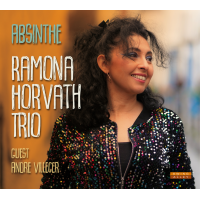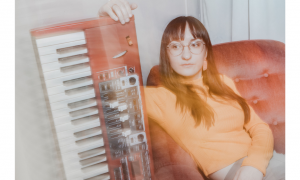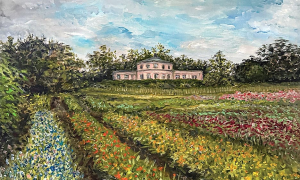 Benny Powell is probably best known for his trombone solo on Count Basie's hit, April in Paris. Benny's Tommy Dorsey-like reading comes about 44 seconds into the 1955 track, when he gently trots out the song's theme and states the melody with enormous warmth and grace. Benny is one of only a handful of surviving members of Basie's original “New Testament" band. In the 1950s, the band pioneered a cooler style of swing with an emphasis on sectional conversation, loping syncopation and the prowess of individual soloists.
Benny Powell is probably best known for his trombone solo on Count Basie's hit, April in Paris. Benny's Tommy Dorsey-like reading comes about 44 seconds into the 1955 track, when he gently trots out the song's theme and states the melody with enormous warmth and grace. Benny is one of only a handful of surviving members of Basie's original “New Testament" band. In the 1950s, the band pioneered a cooler style of swing with an emphasis on sectional conversation, loping syncopation and the prowess of individual soloists. During Benny's Basie years and beyond, his trombone attack has been notable for its powdery sensitivity and taste. But while Benny has long made beauty a priority, he also has been quick to drop the velvet gloves to blow. Examples include several small-group recording dates led by Frank Wess and Osie Johnson in the mid-1950s and Donald Byrd and Gigi Gryce's Jazz Lab sessions of the late 1950s.
Today, Benny, 78, teaches music at New York's New School university and continues to play and tour with pianist Randy Weston and saxophonist TK Blue. In Part 1 of my three-part interview series with the legendary trombonist, Benny talks about his early years, how he came to the trombone, life on the road in the mid-1940s, and the role singer Betty Carter played in helping him land a job with Lionel Hampton's band in late 1948:
JazzWax: What's your fondest memory about growing up in New Orleans?
Benny Powell: The parades. The city was sort of like a carnival every day. You didn't have to wait for Mardi Gras season to hear parades. They had funeral processions in the streets all the time, since people died throughout the year.
JW: Roughly how often did you see and hear funeral parades?
BP: I guess once a month you'd hear and see a procession with musicians. Growing up in that environment, you get passionate about the sound of music. When I was young, I always wondered why there was so much music in New Orleans, more so than in other cities. Later on I realized that New Orleans had no industry to speak of. The main industry was tourism, which accounted for all the music and entertainment. It also was a place that celebrated so many holidays, and there was different music for each occasion.
JW: Did you have brothers and sisters?
BP: Yes. I had three sisters. They were very lovely. They looked out for me. One was older and two were younger. My dad died when I was 5 or 6 years old of a heart attack. Ironically, he worked at the time for the New Orleans' Board of Health. When he died, my mom, me and my three sisters were left to fend for ourselves.
JW: Your mom was in a tough spot.
BP: My mom was a fantastic lady. She had the equivalent of a college degree at that time. But due to economic circumstances after my dad died, she had to take domestic work ironing shirts and cleaning people's houses. But she managed to send us all to college. I only stayed in college a short time before I started traveling with bands. My sisters graduated, though. My mother was a saint. She would go to a shrine every morning and pray. I guess her prayers came through, because we all turned out to be decent people.
JW: How did she keep you in line?
BP: By talking common sense to me. Whenever I screwed up, she'd remind me how hard it was to do what she was doing, and I would feel like two cents. That's all it took to keep me in line. My mom never really had to beat any of us or take harsh measures because she could sort of talk common sense, and we'd fall in line automatically. We'd quickly realize that what she was saying was true.
JW: How did you come to the trombone?
BP: An uncle who sort of pitched in to help my mother acted as a surrogate father. I was at his home one day, leaning backward on the couch and observed a trombone in a case on the floor. I asked him if I could see it. My uncle took it out and handed it to me.
JW: Was that the first time you saw a trombone?
BP: No, I had seen the instrument before in one of those parades. I was riding in a car that had a top down. A man with a trombone was right behind the car, and I had a chance to observe him. I was fascinated by his exuberance while marching in the street. I also noticed that the band playing in the street would take a break at certain times, and go somewhere to have refreshments. I noticed all the ladies kind of flocked around the musicians, which was another intriguing thing. So I guess all of this pointed toward my interest in the trombone when I saw it at my uncle's house.
JW: How old were you?
BP: I was 12 years old. My uncle let me have the trombone that day, and my mother immediately sent me to a guy named Eddie Pierson for lessons at his home after church each Sunday. I practiced every day. I was a pretty diligent guy. My mother and her hardships made me an older man real soon, forcing me to think ahead, like an adult. Actually, my first instrument was a parade drum in grammar school. In grade school I was in the same band as Vernell Fournier [pictured], the drummer. We also went to college together. He was a master on the drums.
JW: Were you able to sight-read quickly?
BP: Yes, through my lessons and practicing. My teacher was really helping me. I also joined a kids' band. There was a guy who had a restaurant, and his son was and still is a musician. The restaurant is called Dooky Chase's, and it's still there. Being in the kids' band helped me advance myself musically.
JW: When were you first paid to play in a band?
BP: At age 14. My first professional date was at the local USO, where we entertained soldiers. For the longest time I thought I was a genius for being hired so young. But soon I realized I got the job because all the older guys were in World War II, and dance bands and halls needed anybody who could play.
JW: Do you remember what you played on that first gig?
BP: We were reading stock arrangements of songs that other bands had made famous. On this particular date, I remember one of the tunes we played was Song of India. There was a trombone solo that I played. I would memorize parts fast and then just look at the music as though I were reading it.
JW: Who was your biggest influence back in the mid-1940s?
BP: I had been listening heavily to Tommy Dorsey and J.J. Johnson [pictured]. They were my heroes. Tommy eventually gave me one of his trombones when I was in the Basie band. He also gave trombones to my Basie bandmates Henry Coker and Bill Hughes. I still have it. I'm thinking about selling it to help put my kids through college. I cherish the horn. It has etchings and designs all over it. It's beautiful.
JW: What was next?
BP: I went to Alabama State Teacher's College for one semester. When I came home for the summer, there was a musician in my neighborhood who was going to Texas to join King Kolax's band. King Kolax [pictured] was a trumpeter, and he needed a trombonist. I asked my mother if I could go. After talking to this other guy who was a little older than me and getting him to promise to look out for me, my mother allowed me to go. I joined King Kolax in Port Arthur, Texas. Kolax had been a trumpet player with Billy Eckstine's band. I understand that Charlie Parker and John Coltrane had played with Kolax, too.
JW: How long were you with Kolax?
BP: About a year. We mostly played on weekends. Then we went out on tours to towns about 200 miles away. One time we were stranded in Oklahoma City. Being stranded meant you got to a city and either the club had burned down or there was some mistake with the booking. Either way, you had to stay there until the head office sent you money for transportation. Rather than wait, I joined Ernie Fields [pictured], who had a territory band based in Tulsa, Oklahoma.
JW: How long were you with Fields?
BP: Also about a year. When I was in Tulsa, in 1948, Lionel Hampton's band was touring in the area. He had just played Oklahoma City when his trombonist left. I auditioned for the band and got the job. Later I found out that vocalist Betty Carter [pictured] figured in my success. She was sort of Hampton's liaison to the bebop world. At the time, she was called Betty Bebop. After my audition, she apparently had given me the thumbs up. She told Hampton I could play in the new bebop idiom, and he was eager at the time to hire musicians who could do so, given how popular bebop was becoming.
JW: How did you learn to play bebop?
BP: I was passionate about bebop from the day I first heard J.J. Johnson on records in 1946. Emery Thompson, a trumpet player, had brought J.J.'s records back from New York. I still remember the first bebop song I heard--Charlie Parker and Dizzy Gillespie's Shaw 'Nuff.
Tomorrow, Benny reflects further on Lionel Hampton, why Benny moved to Hull (Canada), events that caused him to return to New York, and his big break just as Basie was organizing a new big band in late 1951.
JazzWax tracks: To get a feel for the music Benny heard growing up in New Orleans, download Magnificent Seventh's Brass Band: Authentic New Orleans Jazz Funeral from iTunes or at Amazon here. J.J. Johnson's earliest recordings, the 1946 bebop dates that influenced Benny and a generation of trombonists, can be found on J.J. Johnson: Origins (The Savoy Sessions) at iTunes or here at Amazon. To hear Betty Carter with Lionel Hampton in May 1949, download The Hucklebuck from Lionel Hampton: Jukebox Hits 1943-1950 at iTunes.
This story appears courtesy of JazzWax by Marc Myers.
Copyright © 2026. All rights reserved.


























